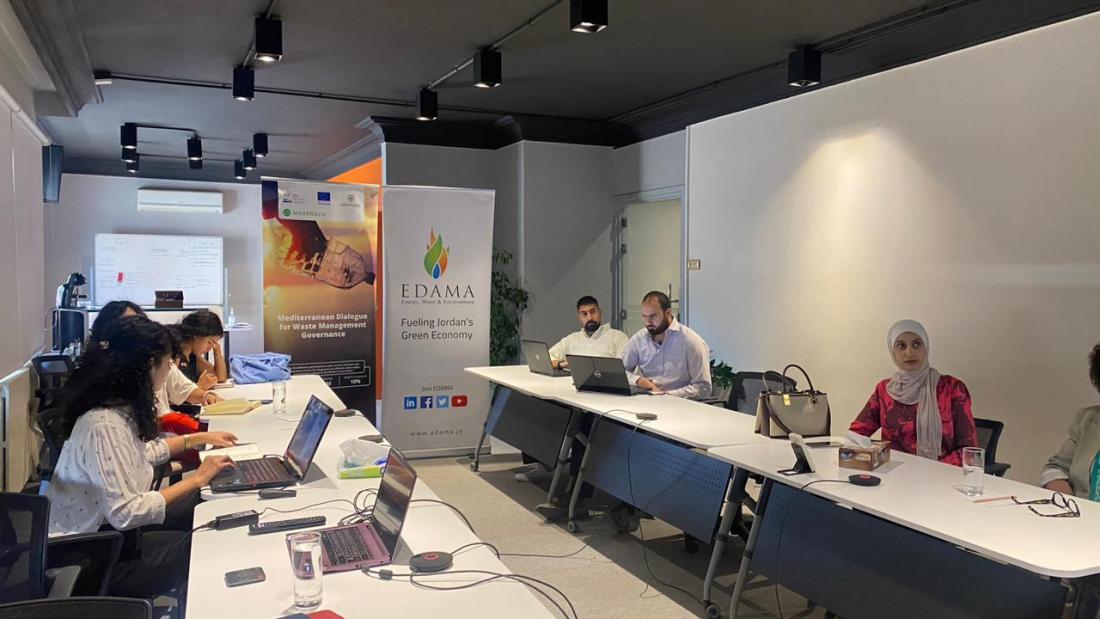Lessons we take home from the Med4Waste sustainability and Zero Waste cooking webinar

The Med4Waste project, in collaboration with its Jordanian partner, EDAMA Association, organised a webinar titled "Sustainable Cooking: Embracing the Mediterranean Flavours while Minimising Food Waste'' on July 31st, 2023. The online event aimed to raise awareness about sustainable cooking practices and zero waste principles. The webinar featured engaging sessions and presentations by experts in the field, including the content creator, Chef Saad Saad from "Have it Vegan," who led a Zero Waste Cooking session and Eng Umaima Majthoum, a food expert who provided techniques and important knowledge to extend the life of food in our kitchens to avoid waste. The event also included informative discussions by Med4Waste capitalised projects that promoted waste management, like DECOST, REUSEMED, and Med4Waste sister project, SIRCLES, who shared their field experience and approaches to navigating waste management challenges innovatively. Throughout the event, participants gained valuable insights into sustainable cooking practices:
Zero waste sustainable cooking tips
During the webinar, Chef Saad shared tips on creating meal plans that avoid excess buying and use all ingredients efficiently. Inspired by “Mediterranean moms”, he demonstrated creative ways to turn food scraps into delectable dishes. Emphasising the significance of celebrating local and seasonal produce in Mediterranean cuisine, Chef Saad highlighted its positive impact on both flavours and environmental sustainability. By prioritising local and seasonal sourcing, this culinary tradition actively contributes to reducing the carbon footprint through minimised transportation emissions. The chef also showcased innovative recipes that turned leftovers into new recipes; you can access these recipes from here.
Minimise food waste in the household
Another important aspect covered during the webinar was the need to minimise food waste in households. Eng Umaima offered valuable tips and techniques for effective kitchen management, emphasising meal planning strategies to make the most of ingredients. She also discussed practices to reduce organic waste, including maintaining personal hygiene in the kitchen, proper food purchasing, storage to extend its shelf life, and avoiding cross-contamination. One of the highlights of Eng Umaima's presentation was her introduction to the "First in, First out" (FIFO) rule, stating, "Rotate the food on the shelves of your fridge so that your old food is closer to the front of the fridge." A necessary role that was discussed as well as the consumption behaviours of buying in large quantities to save money but ending up wasting more. Here the practice of Refuse from the 5R's was an important action to waste management.
Home and community composting
During the webinar, various speakers spotlighted the importance of composting in waste management. Prof Munir Rusan, from Jordan University of Science and Technology, the project manager of DECOST in Jordan, highlighted the environmental and public health impacts of waste disposal and introduced different composting methods that can be implemented on various scales. During his talk, Prof Munir presented DECOST's experiences on compost recovery and municipal waste management practices; he added,” About 100 participants in Bani Kinana region have participated in DECOST “
Composting for a greener future
Another perspective on composting was provided by Eng Ahmad Noubani, SIRCLES technical expert in Jordan, who shared some answers on organic waste challenges on a different scale, private sector, hotels and catering companies. He also highlighted that SIRCLES partners seek new business opportunities in the circular economy, focusing on bio-waste. Through 7 pilot projects, they aim to develop capabilities for business growth and environmental sustainability in diverse local contexts. Noubani highlighted the promising future for organic waste management and the willingness the private sector is going toward regarding organic waste. And focused on the present opportunities in that can be harvested in Jordan and similar context in the region.
Reuse culture and raise awareness of the circular economy
Eng Farah Dawoud, REUSEMED senior communication manager in Jordan, and representing the Jordanian Ministry of Local Authority and Deir Alla municipality, shared the success story of the REUSEMED project, an environmental project promoting the reuse principle among Mediterranean countries and creating a community around reuse and challenging consumption habits. This initiative contributes to the circular economy concept, fostering environmental protection and improved living conditions while creating green job opportunities. The project implementation involved tailored social events, promoting composting practices, specialised training packages in preparation for reuse, and developing a reuse network connecting REUSEMED's cities. Furthermore, Ms Farah shared a special mobile App that was developed by ANEPMA (REUSEMED partners) to facilitate the connection between managers and users of different reuse circuits.
In conclusion, the Med4Waste webinar provided valuable insights into sustainable cooking, reducing food waste, composting, and successful environmental projects. By implementing these lessons in our daily lives, we can actively contribute to a greener and more sustainable future for all. The webinar aimed to create this awareness raising circle that starts with steps easily implemented on the household level but is also important to be advocated to the community. Our capitalised projects, REUSEMED with DECOST and SIRCLES all exchanged their experience in order to give examples from the field to lead change and maintain the sustainability of these projects.
"To watch the recording of the full webinar click here"










